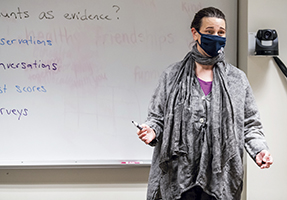What’s ‘Evidence-Based’ When It Comes to Practice?
January 01, 2022
Guidance to ensure you’re buying more than empty phrases to undo long-standing educational inequities

In conversations with teachers and principals, you have likely heard statements such as these: “This program is evidence-based; let’s buy it for our English learners” and “We need to find evidence to guide our virtual learning
choices.”
These days, the phrase evidence-based has become common in our pursuit of equitable school outcomes for different groups of learners. But few stop to consider what exactly the phrase means.
This Content is Exclusive to Members
AASA Member? Login to Access the Full Resource
Not a Member? Join Now | Learn More About Membership
Additional Resources
Elaine Radmer suggests these related books.
- Common Sense Evidence: The Education Leaders’ Guide to Using Data and Research by Nora Gordon and Carrie Conaway, Harvard Education Press
- Powerless to Powerful: Coaches’ Handbook by Chuck Salina and Suzann Girtz
- Powerless to Powerful: Leadership for School Change by Chuck Salina, Suzann Girtz and Joanie Eppinga, Rowman & Littlefield
- Street Data: A Next-Generation Model for Equity, Pedagogy, and School Transformation by Shane Safir and Jamila Dugan, Corwin
- Transforming Schools Through Systems Change by Chuck Salina, Suzann Girtz and Joanie Eppinga, Rowman & Littlefield
What Should You Ask of the Research?
When evaluating research in pursuit of genuine evidence-based practices for use in schools, Neil Duke and Nicole Martin, in their 2011 article, “10 Things Every Literacy Educator Should Know About Research,” in The Reading Teacher, suggest asking these questions.
- What exactly did the research test?
- What exactly did the research find?
- Did the research test the practice, approach or product against something else?
- To what exactly was the practice, approach, or product compared?
- With what sample(s) was the research conducted?
- What outcome measures were used?
- What impact did the research find?
Advertisement
Advertisement
Advertisement
Advertisement



